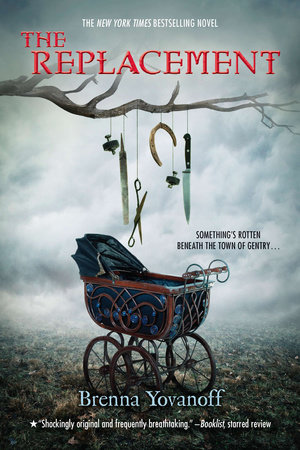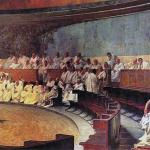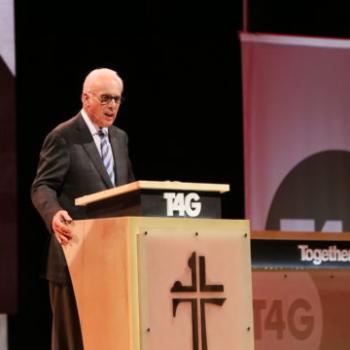I stumbled across The Replacement as an advanced review copy back in my retail days at the now-defunct Borders book chain (more on the perils of book store review copies in the next few posts). The cover of this book was interesting and I took a chance on it. Much to my pleasure I found a young adult book that isn’t completely annoying and is even an enjoyable enough read.
Gentry is a town in the rust belt that has survived the worst of the… well… “rust”, I guess. That is, it has basically kept up a decent level of prosperity and happiness for its citizens despite the collapse of American industry. This is not because the people of Gentry are extra-hardworking and industrious, it is because of a subculture of gods, spirits, and otherworldly beings who keep the town healthy. Some of these beings ask in return only the love and adulation of the townspeople–in the form of a band that plays at the local club. Others, however, demand an occasional sacrifice. A child is snatched from a crib and replaced with a castoff critter of their own. The child is then sacrificed and the castoff usually dies through lack of the aforementioned love and adulation. This is the story of one such castoff who survives and grows up as a human. We follow Mackie as he discovers this underground world and his own roots in it.
In other words, I would in no way be surprised to learn that this started out as Supernatural fan-fiction.
So the book is excellent as a book; if you haven’t, go read it. With that said, the theology here is basically theological liberalism run amok. (Again: this might be Supernatural fan-fiction.) And I know, I know, it’s YA fiction so let’s not dissect it too much. But still, it is worth noting that the view of the role of faith relative to the supernatural realm in this book is basically the default view of most modern non-Christians (and even a sadly large number of modern Christians). In The Replacement, the supernatural world is fueled and defined by the faith of the community. The fairy (for lack of a better phrase) creatures take on the aspects which the general consensus believes them to have, and get their energy and power from the devotion and sacrifice of the people of the town. In exchange, they grant the mild worldly blessings that make life worthwhile (moderate prosperity, a strong community, etc). As the beliefs of the town change over time, the nature of the creatures change as well. And as the devotion of the town ebbs and flows, the strength and vitality of the creatures does as well.
So as a political scientist I’ll go ahead and tell you that there is the aroma of truth about some of this view of the world. Our faith and devotion do make civil society work. The standard example is in the value of money. If tomorrow there were a general loss of confidence in the value of a dollar, our nation would be in a world of hurt and our culture would come crashing down. The same can be applied to virtually any non-tangible of our culture. (The tangible ones tend to have their own rules. For example: agriculture. It either rains or it doesn’t, regardless of our faith in the weather.)
And yet as a Christian I can confidently say that this view of faith and its power is spiritual hogwash. It is true that we are saved through justification by faith alone, and in that sense it is entirely correct to highlight faith as the central aspect of human nature and as critical in the religious life. And yet, ‘faith alone’ is not a directionless statement. We are to have faith in something–namely Christ. What matters is not just that we have faith in general or that our faith is deep (though both are important), what matters at the end of the day is what we are putting our faith in. To steal an example I heard in a sermon once, you might have no faith in the ability of a chair to hold you up, and so refuse to sit down. Or you might have just a little bit of faith and so tentatively sit. Or you might have a lot of faith and so confidently sit. In all three scenarios, the amount of faith you have has no bearing on the ability of the chair to actually hold you off the ground. The same is true of spiritual reality. The truth or falsehood of something is disconnected from our faith in it. Christ either has done the work of salvation for His people on the cross, or He has not. My faith may (heck, does) affect my place in that salvation, but it doesn’t affect the nature of its reality. Christ is no more or less powerful because of what I believe about Him, and He is no more or less likely to do good to His people because of the adulation (or lack thereof) of the masses. He exists and acts in objective reality despite and above anything we do, say, or think.
And all that said: don’t let all of this turn you off from the book–it really is an excellent one and is worth reading.
Dr. Coyle Neal is co-host of the City of Man Podcast and an Assistant Professor of Political Science at Southwest Baptist University in Bolivar, MO. If fairies were dependent on his faith and devotion, they’d be in a lot of trouble.














